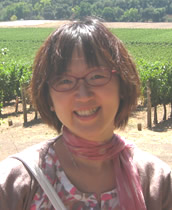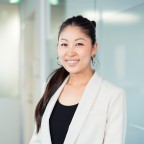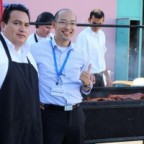Professor Makiko Deguchi is an associate professor in the Department of English Studies. She completed her undergraduate work in Economics at Wellesley College and then went on to earn two Masters in Psychology and Human Development, as well as her Ph.D. in Cultural Psychology, at Boston University. She recently translated the book Diane J. Goodman’s “Promoting Diversity and Social Justice: Educating Members of Privileged Groups” 2011, into Japanese. Professor Deguchi sat down with editors of the student journal Angles, to discuss the book, her career, and her teaching philosophy.
Angles Editors: Can you tell us about your background? You lived in America for a long time?
Professor Deguchi: I was born in Japan (Nara Prefecture), and when I was four, I moved to New York with my family because my father was transferred  by his company. At age six, we moved to Montreal, and then we returned to Japan when I was nine, where I lived in Ashiya (Hyogo Prefecture) until age 11. Then less than two years later, I was back in the U.S. After completing junior high school and high school in Yonkers, New York, I attended Wellesley College for my undergraduate studies. As you can see, I had very little exposure to education in Japan.
by his company. At age six, we moved to Montreal, and then we returned to Japan when I was nine, where I lived in Ashiya (Hyogo Prefecture) until age 11. Then less than two years later, I was back in the U.S. After completing junior high school and high school in Yonkers, New York, I attended Wellesley College for my undergraduate studies. As you can see, I had very little exposure to education in Japan.
Angles Editors: Didn’t you want to come back to Japan?
Professor Deguchi: I certainly did! All my friends eventually returned to Japan, and I didn’t feel as though I fit well in the U.S. at the time. But the timing was determined by my father’s company and so we stayed. The big question during high school was, “What do I do about college?” I was accepted to ICU (International Christian University in Tokyo, Japan) but since my parents were still in New York, they suggested that I attend a U.S. college. I was feeling somewhat ambivalent this—I ended up attending Wellesley College—and I thought that if my parents ever did return to Japan, I would follow them and transfer to a Japanese university. In fact, I knew several Japanese women who attended Wellesley for their first year or so and transferred to a university in Japan. I think many of us returnees preferred attending a Japanese university.
Angles Editors: That’s interesting because a lot of students have this image that you’re very ‘American.’
Professor Deguchi: To be quite honest, when I returned to Japan after graduating from Wellesley, I vowed to myself “I’m never going back to the U.S. I’m done with America.”
Angles Editors: What made you so against America?
Professor Deguchi: I felt that there wasn’t a good “personality fit.” I grew up in a typical Japanese family where I wasn’t encouraged to articulate my thoughts and wishes. My family socialized me to intuit what others think and feel and I think I was very comfortable in that kind of a setting. I wasn’t prepared to verbalize my thoughts or to be very assertive. And I know a lot of people don’t believe me but I am an introvert at heart and prefer to not say anything if it could be helped. So I think people in the U.S. viewed me as someone who didn’t have much to say or much personality. I think I was perceived as “nice,” and rather boring, which upon reflection makes sense—I often censored myself because I thought no one was interested in hearing about Japan or Japanese culture. This prevented me from ever revealing my true self. The story was very different when I attended hoshuko or Japanese Saturday school. I could be myself there and that became my refuge. It’s somewhat ironic because if I didn’t have hoshuko, I probably would have tried a lot harder to acculturate into American society. But when one has access to two different schools, of course one will gravitate towards the one that they feel happier and accepted. I was “doing time” against my will in the U.S., so when I finished college, I told my parents that I’d paid my dues, and I was going back. Thus started my life in Tokyo.
Angles Editors: Do you still have similar feelings toward the States?
Professor Deguchi: I think the really good thing that happened sort of by accident, was that I ended up spending another fourteen years in the U.S. in my adulthood, and this helped change my feelings toward myself and the U.S. After working in Japan for seven years at a translation company in my twenties, I decided to apply for a Master’s program in psychology, and was accepted to Boston University. Even though I was apprehensive about returning to the U.S., I think returning as an adult allowed me to see things in a different light. After I began studying cultural psychology, I also began to appreciate the differences between the two cultures.
I think another good thing that came from this second stay in the U.S. was that I underwent counseling for several years. In the counseling sessions, despite my efforts to fight against it, all the sadness, hurt, and anger that I felt growing up in the U.S. resurfaced. Attending American school during my teen years was very hard for me psychologically, and yet I played the role of “good daughter” and never confided in anyone about feeling so alone. I also blamed myself as the reason for not being able to fit into mainstream American society. I think letting out all those emotions was necessary for the healing process to begin. It was like the emotions just poured out of me. It surprised even myself. But it turned out to be a very healthy process for me to undergo. Through counseling, I also came to realize that I was in fact partially culturally American. Before my identity was that of a Japanese person who was a native speaker of English—that was how I identified myself. But there was an integration that took place that made me realize that even though I’m Japanese, there were aspects about myself that were very American, too, and that’s okay. I didn’t need to fight that anymore.
Also, teaching in an American university helped me further embrace the American side of my identity. When I was teaching at Wellesley College as an adjunct instructor, for example, the majority of students taking my course were Asian. They would come talk to me, and tell me about what they were going through—issues around racism, identity, and self-esteem. I was astonished to realize that these young women were experiencing the same things I had growing up, and that made me feel more connected to the experiences of Asian-Americans. I began coming out of my shell little by little. My high school days were just about daily survival, but through counseling, my therapist encouraged me to take risks and show myself more, now that I was living in a very different environment full of understanding adults. I began talking more openly about Japan and myself, and I was surprised to find that people responded and saw me as someone interesting with a unique point of view—something I hadn’t expected. It was during this period that several of my good friends described me as “You just blossomed!” A lot of the courses I teach at Sophia University stem from my personal experiences as a racial/ethnic minority and someone straddling two cultures of the U.S. and Japan.
Professor Deguchi is also the assistant director of the Center for Global Discovery and the Director of Short-Term Programs at Sophia University. She teaches classes in Cultural Psychology, Privilege, and the Psychology of Positionality. To learn more about her ideas, please take her courses or read the book she translated.
To read the second part of our interview with Professor Deguchi, please click here.


















